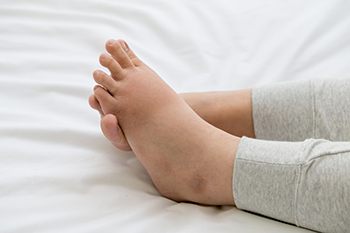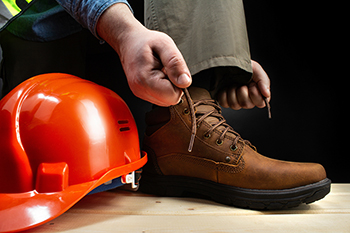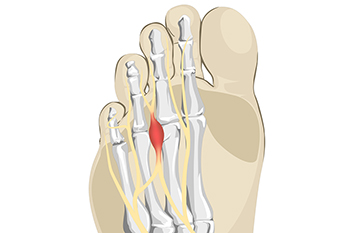Items filtered by date: February 2023
Swollen Feet Can Be Related to Back Pain

Sometimes, an individual’s feet may swell up in size and become filled with extra bodily fluids. There are many different reasons why an individual might experience increased foot swelling. For example, when an individual is pregnant, they may have foot swelling. Sometimes, certain things that cause swollen feet can also result in lower back pain. Importantly, the two are not always linked, but sometimes can be. Pregnancy is one such condition that can cause both lower back pain and foot swelling. It is well-known that pregnancy is associated with swollen feet due to increased fluid accumulation. Additionally, due to the extra strain linked with carrying a baby to term, pregnancy can also cause pain in the lower back area. Pregnancy, of course, is not the only thing on the list that can cause both feet swelling and lower back pain. In addition to pregnancy, arthritis, piriformis syndrome, and infection can also cause these two symptoms through inflammation. It is suggested that you contact a podiatrist for more information about the link between swollen feet and back pain.
Swollen feet can be a sign of an underlying condition. If you have any concerns, contact Deborah Rosenfeld of Rosenfeld Podiatry. Our doctor can provide the care you need to keep you pain-free and on your feet.
Swollen feet are a common ailment among pregnant women and people who stand or sit for extended periods. Aging may increase the possibility of swollen feet and patients who are obese often notice when their feet are swelling too. There may be medical reasons why swollen feet occur:
- Phlebitis - A condition that causes the veins to become inflamed and can also cause leg pain.
- Liver disease - This may lead to low blood levels of albumin which is a protein. This can cause fluid in the blood to pass into the tissues and several areas of the body can become swollen.
- Heart failure - When the heart doesn’t pump properly the blood that is normally pumped back to the heart can pool in the veins of the legs causing swollen feet.
- Kidney disease - One of the main functions of the kidneys is releasing excess fluid in the body. This type of condition can make it difficult for the kidneys to function properly, and as a result the feet may become swollen.
- Deep-vein thrombosis (DVT)- This is a serious condition where blood clots form in the veins of the legs. They can block the return of blood from the legs to the heart which may cause the feet to swell. It is important to be treated by a podiatrist if this condition is present.
Swollen feet can also be caused by bone and tendon conditions, including fractures, arthritis, and tendinitis. Additionally, there may be skin and toenail conditions and an infection may cause the feet to swell. Patients who take medicine to treat high blood pressure may be prone to getting swollen feet.
Many patients elevate their feet to help relieve the swelling and this is generally a temporary remedy. When a podiatrist is consulted the reason behind the swelling can be uncovered and subsequently treated.
If you have any questions please feel free to contact our office located in Marlton, NJ . We offer the newest diagnostic tools and technology to treat your foot and ankle needs.
Do My Flat Feet Need Surgery?

The medical name for flat feet is called pes planus. The absence of the arch is easily noticed as the foot lies flat while standing on the floor. This can affect the foot structure, and as a result, many people have foot pain. Most babies are born with flat feet, and the arch will develop in the teenage years. In some adults, the arch never forms, and they may experience pain which can interfere with completing daily activities. Having surgery on flat feet may be an option for relief. This type of reconstruction surgery consists of repairing the tendons, ligaments, and bone structure that can reshape the foot and ultimately support the arch. There are several pros and cons of having this type of surgery performed. If you have flat feet and are considering surgery, it is strongly suggested that you speak with a podiatrist who can determine if this is the right decision for you.
Foot surgery is sometimes necessary to treat a foot ailment. To learn more, contact Deborah Rosenfeld of Rosenfeld Podiatry. Our doctor will assist you with all of your foot and ankle needs.
When Is Surgery Necessary?
Foot and ankle surgery is generally reserved for cases in which less invasive, conservative procedures have failed to alleviate the problem. Some of the cases in which surgery may be necessary include:
- Removing foot deformities like bunions and bone spurs
- Severe arthritis that has caused bone issues
- Cosmetic reconstruction
What Types of Surgery Are There?
The type of surgery you receive will depend on the nature of the problem you have. Some of the possible surgeries include:
- Bunionectomy for painful bunions
- Surgical fusion for realignment of bones
- Neuropathy decompression surgery to treat nerve damage
Benefits of Surgery
Although surgery is usually a last resort, it can provide more complete pain relief compared to non-surgical methods and may allow you to finally resume full activity.
Surgical techniques have also become increasingly sophisticated. Techniques like endoscopic surgery allow for smaller incisions and faster recovery times.
If you have any questions please feel free to contact our office located in Marlton, NJ . We offer the newest diagnostic and treatment technologies for all your foot and ankle needs.
Preventing Foot Problems if You Work on Your Feet

Some jobs require one to stand on their feet for prolonged time periods. This can cause tiredness and increase the risk of foot problems as it puts strain on bones, joints, tendons, muscles, and ligaments. Standing for long periods of time can reduce blood flow to the lower extremities or create an accumulation of blood in the foot or ankles, also leading to soreness. Flat feet, plantar fasciitis, and edema are all problems associated with working on your feet all day. Tips for preventing such pain include taking more seated breaks, standing on different surfaces, using anti-fatigue mats underfoot, and wearing appropriate footwear. Footwear includes shoes and socks, and both should fit well, without being too tight or loose. Shoes should support the arch well and have cushioning that absorbs shock and stress. If you work on your feet all day and have foot problems, see a podiatrist who can provide additional suggestions to help you feel more comfortable.
While working on the feet, it is important to take the proper care of them. For more information about working on your feet, contact Deborah Rosenfeld from Rosenfeld Podiatry. Our doctor will treat your foot and ankle needs.
Working on Your Feet
Standing on your feet for long periods of time can cause stress and pain in your feet. Your whole body may experience change in terms of posture, back pain, bunions, callouses and or plantar warts. There are ways to avoid these conditions with proper foot care, smart choices and correct posture.
Positive Changes
Negative heeled shoe – Choosing this shoe type places the heel slightly lower than the ball of the foot. These are great for overall foot health. Find shoes that fit you correctly.
Go barefoot – Our feet were not designed to be enclosed for all hours of the day. Try to periodically expose your feet to air.
Eliminate Pain
Foot Exercises – Performing simple exercises, incorporating yoga and doing stretches are beneficial. This will allow increased blood flow to the area and muscles of the foot.
Achilles tendon – Stretching the foot out flat on the floor will relax the calf muscles and tendon. These exercises can be performed almost anywhere. Make sure you add these exercises to your daily regimen.
With a little bit of this information and knowing more about foot health, you will notice changes. Foot stretches and proper footwear will help with pain and prevent further issues.
If you have any questions please feel free to contact our office located in Marlton, NJ . We offer the newest diagnostic and treatment technologies for all your foot and ankle needs.
A Common Cause of Morton’s Neuroma

The foot condition that is known as Morton’s neuroma affects the nerve between the third and fourth toes. It generally happens to women who frequently wear high heels, which can compress the toes. In severe cases, the pain can be excruciating, and relief methods are often sought. The symptoms that many patients feel can be likened to having a small pebble or stone in the shoe, and the foot may tingle or feel numb. In mild cases, temporary relief may be found when wider shoes are worn with a low heel, and extra weight is shed, if applicable. Additionally, wearing soft insoles in wider shoes may help to lessen the pressure on the nerve. People who suffer from Morton’s neuroma often seek the counsel of a podiatrist, who can recommend the correct treatment, which may include surgery for the removal of the nerve.
Morton’s neuroma is a very uncomfortable condition to live with. If you think you have Morton’s neuroma, contact Deborah Rosenfeld of Rosenfeld Podiatry. Our doctor will attend to all of your foot care needs and answer any of your related questions.
Morton’s Neuroma
Morton's neuroma is a painful foot condition that commonly affects the areas between the second and third or third and fourth toe, although other areas of the foot are also susceptible. Morton’s neuroma is caused by an inflamed nerve in the foot that is being squeezed and aggravated by surrounding bones.
What Increases the Chances of Having Morton’s Neuroma?
- Ill-fitting high heels or shoes that add pressure to the toe or foot
- Jogging, running or any sport that involves constant impact to the foot
- Flat feet, bunions, and any other foot deformities
Morton’s neuroma is a very treatable condition. Orthotics and shoe inserts can often be used to alleviate the pain on the forefront of the feet. In more severe cases, corticosteroids can also be prescribed. In order to figure out the best treatment for your neuroma, it’s recommended to seek the care of a podiatrist who can diagnose your condition and provide different treatment options.
If you have any questions, please feel free to contact our office located in Marlton, NJ . We offer the newest diagnostic and treatment technologies for all your foot care needs.


